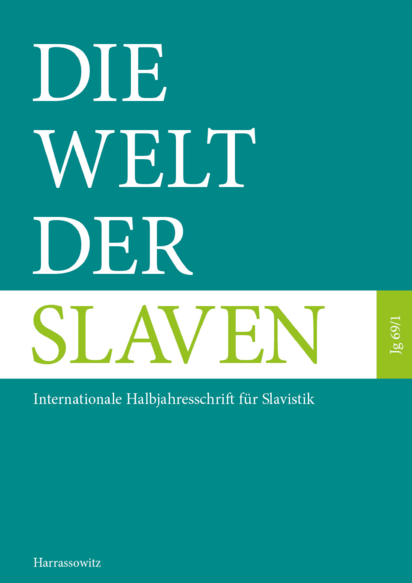Deržavin und seine Marmorbüste
DOI:
https://doi.org/10.13173/WS.69.1.190Schlagwörter:
autobiographical poetry, Deržavin’s poem “My Bust“, conflicted monologue, self-irony, Horace, eternal fameAbstract
Deržavin and his marble bust
This paper deals with Deržavin’s autobiographical poetry as exemplified by his poem “My Bust“. A marble bust which Deržavin had ordered for himself is a source of hope and self-doubt for his lyrical speaker. Does he actually deserve the honour represented by this sculpture and, if so, on which grounds? Accordingly, the lyrical monologue turns into a sequence of sharply contrasting moods of confidence and self-deprecation, which is unique in eighteenth-century Russian poetry. The dramatism of this monologue calms down at the end of the poem in a spirit of Horatian wisdom. The poem is remarkable for its self-critical and self-ironic character. The article closes with a reflection on Deržavin and his claim of eternal fame.
Literaturhinweise
Alʹtšuller, Mark. 2007. Beseda ljubitelej russkogo sloga: U istokov russkogo slavjanofilʹstva. Moskva.
Burckhardt, Jacob. 1966. Die Kultur der Renaissance in Italien [1860]. Stuttgart.
Burke, Peter. 1992. The Fabrication of Louis XIV. New Haven, London.
Busch, Wolfgang. 1964. Horaz in Rußland: Studien und Materialien. München.
Chodasevič, Vladislav F. 1988. Deržavin [1931]. Moskva.
Deržavin, Gavrila R. 1868–1878. Sočinenija. 2. Aufl. (Hg. Jakov K. Grot.) Bd. I–VII. Sanktpeterburg.
Deržavin, Gavrila R. 1957. Stichotvorenija. Leningrad.
Eckermann, Johann Peter 1908. Gespräche mit Goethe in den letzten Jahren seines Lebens. Jena.
Fomenko, Irina Ju. 1983. Avtobiografičeskaja proza G. R. Deržavina i problema professionalizacii russkogo pisatelja. XVIII vek 14. 143–164.
Fricke, Harald & Stocker, Peter. 2000. Lyrisches Ich: Das Subjekt von Gedichten ohne Rollenfiktion. In Fricke, Harald (Hg.), Reallexikon der deutschen Literaturwissenschaft, Bd. II, 509–511. Berlin, New-York.
Golʹburt, Ljubovʹ. 2006. O čem svidetelʹstvujut pamjatniki? In Obatin, G. V. & Pesonen, P. (Hg.), Istorija i povestvovanie, 51–68. Moskva.
Grot, Jakov K. 1997. Žiznʹ Deržavina [1883]. Moskva.
Gukovskij, Grigorij A. 1947, G. R. Deržavin. In ders., Stichotvorenija, V–LVI. Leningrad.
Horaz. 1957. Sämtliche Werke: Lateinisch und Deutsch. (Übers. Hans Färber.) Bd. I–II. München.
Ilʹina, Tatʹjana V. 1999. Russkoe iskusstvo XVIII veka. Moskva.
Keil, Rolf-Dietrich. 1961. Zur Deutung von Puškins „Pamjatnik“. Die Welt der Slaven 6. 174–220.
Klein, Joachim. 2014. Staatsdienst, Faulheit und „süße Muße“ in der russischen Literatur des 18. Jahrhunderts. Wiener Slawistischer Almanach, Sonderband 91. 19–37.
Klein, Joachim. 2023. Deržavin und die Rückkehr des siegreichen Zaren. Zeitschrift für Slavische Philologie 79(1). 195–233.
Kononko, Evgenija N. 1973. Primečanija na sočinenija Deržavina. Voprosy russkoj literatury 2 (22). 107–116.
Kononko, Evgenija N. 1974. Primečanija na sočinenija Deržavina (prodolženie). Voprosy russkoj literatury. 1 (25), 81–93.
Kononko, Evgenija N. 1975. Primečanija na sočinenija Deržavina (Častʹ II). Voprosy russkoj literatury 1 (23). 110–125.
Lachmann, Renate. 1987. Imitatio und Intertexualität: Drei russische Versionen von Horaz’ „Exegi monumentum“. Poetica 19. 195–237.
Lappo-Danilevskij, Konstantin Ju. 2000. Deržavins letztes Gedicht. Die Welt der Slaven 45(2). 221–232.
Lauer, Reinhard. 2002. Aleksandr Puškin: „Ja pamjatnik sebe vozdvig nerukotvornyj“. In Zelinsky, Bodo (Hg.), Russische Lyrik, 1–10. Köln, Weimar, Wien.
Lefèvre, Eckart. 1993. Horaz: Dichter im augusteischen Rom. München.
Loewen, Donald. 2005. Questioning a poet’s explanations: Politics and self-presentation in Deržavin’s “Footnotes” and “Explanations”. The Russian Review 64. 381–400 [DOI: 10.1111/j.1467-9434.2005.00366.x].
Lomonosov, Michail V. 2011a. Polnoe sobranie sočinenij v desjati tomach. Bd. VII. 2. Aufl. (Hg. E. Ė. Babaeva, Viktor M. Živov, Lidija I. Sazonova.) Moskva, Sankt-Peterburg.
Lomonosov 2011b. Michail V. Lomonosov, Polnoe sobranie sočinenij v desjati tomach. Bd. VIII. 2. Aufl. (Hg. Nadežda Ju. Alekseeva, Viktor M. Živov.) Moskva, Sankt-Peterburg.
Pinčuk, Aleksej L. 1955. Goracij v tvorčestve G. R. Deržavina. Učenye zapiski Tomskogo gosudarstvennogo universiteta 24. 71–86.
Pumpjanskij, Lev V. 2000. Ob ode Puškina „Pamjatnik“ [1923]. In ders., Klassičeskaja tradicija: Sobranie trudov po istorii russkoj literatury, 197–209. Moskva.
Puškin, Aleksandr S. 1977–1979. Polnoe sobranie sočinenij v desjati tomach. Leningrad.
Rosenberg, Karen. 1983. The Quarrel between Ancients and Moderns in Russia. In Cross, Anthony (ed.), Russia and the West in the eighteenth century, 196–205. Newtonville (MA).
Segebrecht, Wulf. 1991. Goethes Erneuerung des Gelegenheitsgedichts. Goethe-Jahrbuch 108. 129–136.
Segebrecht, Wulf. 1997. Gelegenheitsgedicht. In Weimar, Klaus (Hg.), Reallexikon der deutschen Literaturwissenschaft, Bd. 1, 688–691. Berlin, New York.
Slovarʹ 1984–. Slovarʹ russkogo jazyka XVIII veka. Bd. 1–. Leningrad.
Syndikus, Hans Peter. 2001. Die Lyrik des Horaz: Eine Interpretation der Oden. Bd. I–II. 3. Aufl. Darmstadt.
Topčiev, Aleksandr V. & Figurovskij, Nikolaj A. & Čenakal, Valentin L. 1961. Letopisʹ žizni i tvorčestva M. V. Lomonosova. Moskva, Leningrad.
Venditti, Michela. 2013. „Lebedʹ“ G. R. Deržavina: Goracianskaja tradicija i obraz poėta. In Bogatyrev, Sergei & Dixon, Simon & Hartley, Janet M. (eds.), History and literature in eighteenth century Russia, 48–60. London.
von Albrecht, Michael. 1973. Zur Selbstauffassung des Lyrikers im augusteischen Rom und in Rußland: – Horaz (carm. 2,20 und 3,30) – Deržavin – Puškin – Jevtušenko –. Antike und Abendland 18. 58–86 [DOI: 10.1515/9783110241303.58].
Voronov, Michail G. & Chodasevič, Galina D. 1982. Architekturnyj ansamblʹ Kamerona v Puškine. Leningrad.
Zilsel, Edgar. 1926. Die Entstehung des Geniebegriffs: Ein Beitrag zur Ideengeschichte der Antike und des Frühkapitalismus. Tübingen.
Zorin, Andrej L. 1987. Glagol vremen. In Zorin, Andrej L. & Nemzer, Andrej S. & Zubkov, Nikolaj N. (Hg.), Svoj podvig soveršiv…, 5–154. Moskva.

